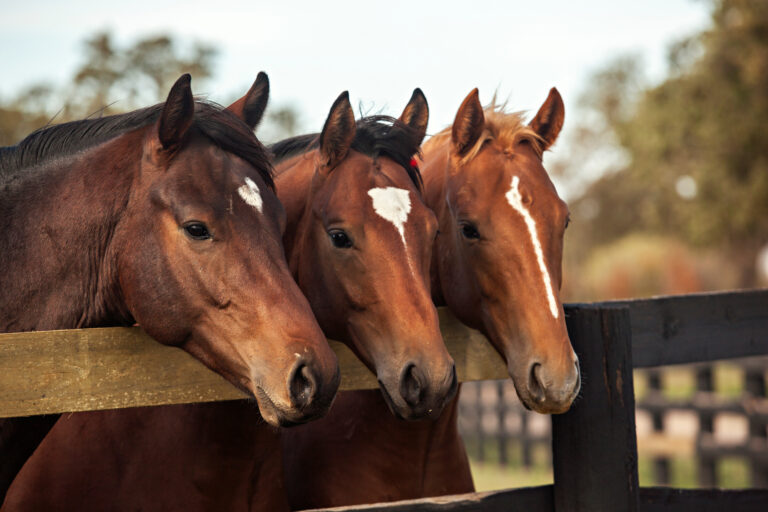The fifth Welfare and Safety of the Racehorse Summit concluded Wednesday afternoon in Lexington, Kentucky, with an emphasis on the ongoing need to collect data and make it available through transparency initiatives, industry conferences and continuing education in order to enhance safety.
The two-day conference in the Keeneland sales pavilion once again brought together a cross-section of the Thoroughbred industry, including owners, breeders, trainers, veterinarians, horsemen, jockeys, track managers and regulators.
Like the four previous summits, held in October 2006, March 2008, June 2010, and October 2012, this summit was underwritten and coordinated by The Jockey Club and Grayson-Jockey Club Research Foundation and hosted by Keeneland Association.
“As we have said in the past, this summit serves as a ‘think tank’ for this industry,” said James L. Gagliano, president and chief operating officer of The Jockey Club. “This edition proved not only that initiatives generated from past summits are having a positive impact, but also that there are new ideas, new information, new practices and new technology that can be used to further enhance the welfare and safety of our athletes, and we need to share that information in a transparent manner.”
There were panel discussions and/or presentations on Wednesday on the owner/trainer/veterinarian relationship, changes in regulations of corticosteroids, the Jockey Injury Database, racetrack surfaces, and continuing education for trainers. There was considerable discussion pertaining to transparency of veterinary records during Wednesday’s first session that was entitled: “Making Safety a Priority in Your Racing Company.”
Tuesday’s topics included the use of data to promote equine safety, the status of the modern Thoroughbred, an update on the National Uniform Medication Program, and bone development in racehorses.
The summit was available on a live video stream from grayson-jockeyclub.org. In addition to a few hundred attendees in the Keeneland sales pavilion, nearly 1,800 people in more than a dozen countries watched the live video stream. A replay of Tuesday’s summit and many presentations are available on grayson-jockeyclub.org; the replay from Wednesday will be available soon.
A sampling of comments on several topics from presenters and panelists follows:
Gary Contessa, trainer: “We’ve got to become transparent with vet records for the benefit of the horse. We need transparency. If we had transparency, we’d have a lot less breakdowns.”
Bill Casner, owner: “The more information we have, the more transparency we have and the more accountability we have, the more we can reduce catastrophic injuries…we have to continue to work to reduce catastrophic injuries…we are still feeling the effects of Barbaro. Catastrophic injuries have a catastrophic effect on our industry…wonderful things have come from this conference [the Welfare and Safety of the Racehorse Summit] and we’re putting more of an emphasis on doing the right thing for the horse and for the rider.”
Dr. Carl Mattacola, division director and assistant professor of Athletic Training, University of Kentucky, speaking about the Jockey Injury Database: “Identification of injuries provides a better ability to better protect and seek preventable mechanisms to put welfare of jockeys at the forefront. You have to have data to understand trends.”
Dr. Rick Arthur, equine medical director, California Horse Racing Board: “I’m not convinced that horses are weaker, but I am convinced that they are managed differently…and the trainer and his vet know more about a particular horse than a regulatory vet ever will….this is a cat and mouse game, the same as we see in human sports…we need research and development to study new drugs. We need a robust out-of-competition testing program.”
Dr. Mick Peterson, executive director of the Racing Surfaces Testing Laboratory: “Surfaces do not ‘cause’ injuries but they can improve the situation…the information we collect is shared industrywide; it is not proprietary information…and safer surfaces benefit all horses, riders, fans and owners.”
Dr. Mary Scollay, equine medical director, Kentucky Horse Racing Commission: “We as an industry need to dispel the myth of inevitability, that a racing fatality is not just part of the game….No stakeholder benefits from the death of a horse.”
Dr. Jennifer Durenberger, director of racing, Massachusetts Gaming Commission: “If you are going to race a horse in Massachusetts, you will be subject to our state racing commission rules, house rules and standards set by the NTRA Safety & Integrity Alliance…If a horse is on a vet’s list and ineligible to race in one state, he should be ineligible to race in other states.”
Dr. C. Wayne McIlwraith of Colorado State University: “We need sufficient time between treatment [with corticosteroids] and racing time for regulatory veterinarians to accurately evaluate a horse.”
Cathy O’Meara, coordinator of industry initiatives for The Jockey Club, on the topic of advanced horsemanship and continuing education: “The reality is that [continuing] education is the heart of where meaningful change can take place in our industry…getting educational programming into the hands of those who can use it is vital.”
Grayson-Jockey Club Research Foundation is traditionally the nation’s leading source of private funding for equine medical research that benefits all breeds of horses. Since 1983, the foundation has provided more than $20.9 million to fund 310 projects at 41 universities in North America and overseas. Additional information about the foundation and the summit is available at grayson-jockeyclub.org.








